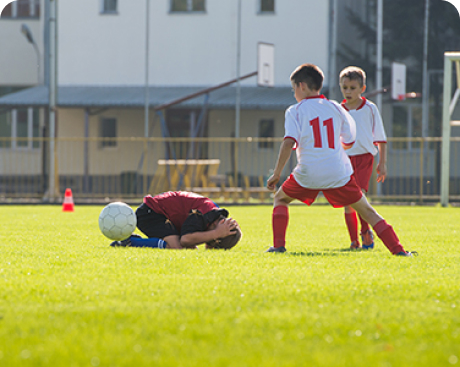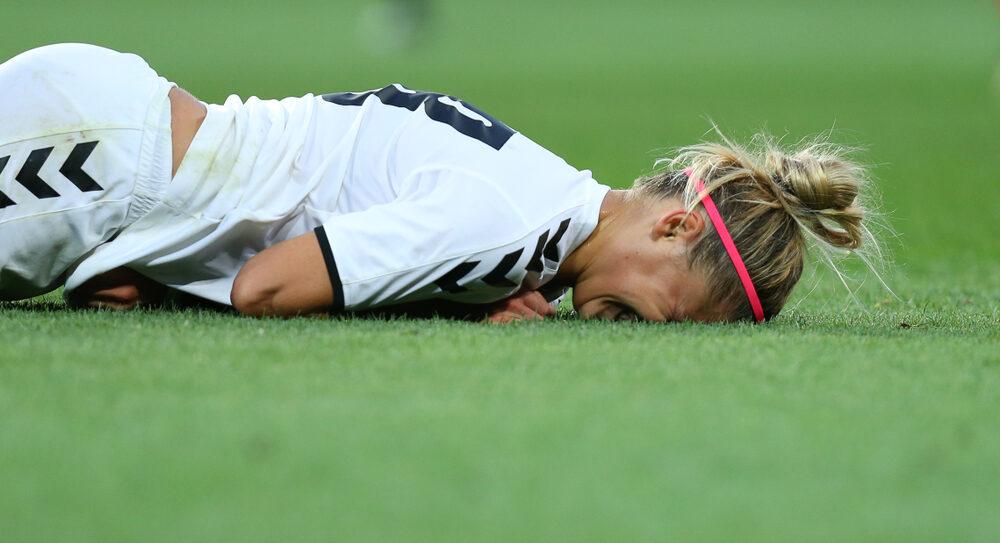Concussion Treatments
There are many options available to aid in your recovery.
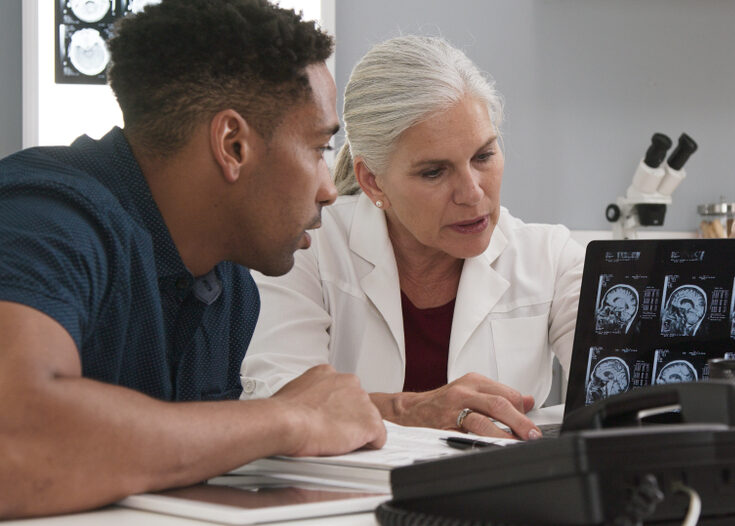
Concussion Treatments
A concussion is a brain injury and should be treated with care. Rest and a gradual return to activity under the guidance of a medical professional can often clear up symptoms within one month.
However, each person experiences a concussion differently, so being aware of the symptoms and consulting with a healthcare provider early on can help ensure effective concussion management and help with a full recovery.
How should you respond to a
suspected concussion?
Although it may be tempting to brush off a head impact or try to tough it out, a brain injury should always be taken seriously. If you suspect that you or someone else has suffered a concussion, whether it’s from sports, military service, an act of violence, or an accident, follow these steps:

Remove yourself from physical and cognitive activity
Continuing to engage in physical activity after a concussion can increase the risk of further injury and delay healing. Taking time off from school or work may be necessary, as well.
Look for signs and get symptoms evaluated
As soon as the suspected brain injury occurs, pay attention to any changes in behaviour, mood, or physical functioning. Signs of a concussion can include balance problems, a glazed look in the eyes, delayed response to questions, and confusion. Symptoms can include headache, sensitivity to light and noise, ringing in the ears, memory loss, changes in sleep patterns, anxiety, and depression.
Seek medical attention
If you or someone else is showing signs of a concussion, it’s important to seek medical attention immediately. A doctor can properly diagnose and assess the severity of the injury and provide appropriate treatment recommendations.
For most concussions, simply resting and gradually returning to activity under the guidance of a medical professional clears up concussion symptoms within one month. This is the current standard of care and has helped countless concussion patients through a full recovery.
Visit our Concussion Response page for a deeper dive into the steps you should take after a concussion.
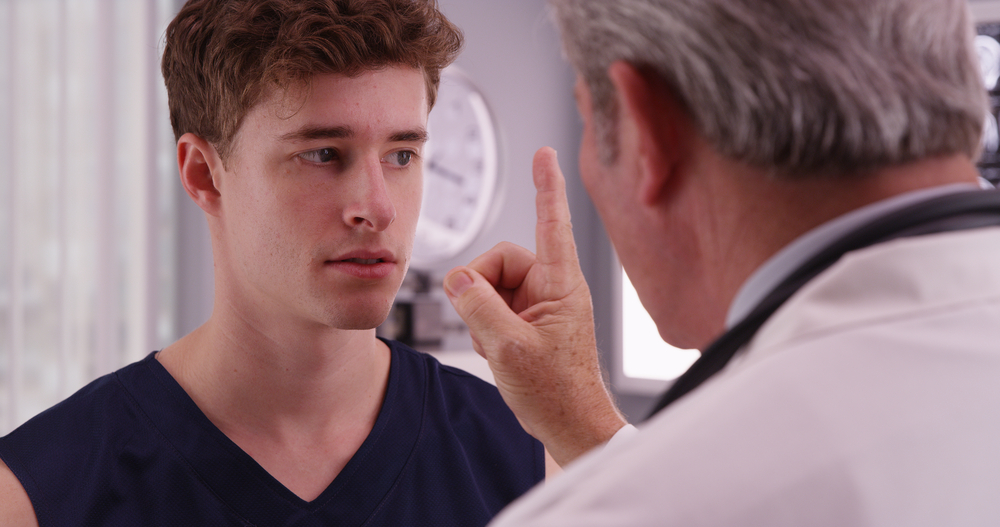
Finding the right doctor for concussion treatment
When it comes to finding the appropriate treatment for a concussion, choosing the right doctor is the first step to recovery. To assist you in searching for a concussion specialist, please refer to the links below. These resources will help you make an informed decision to ensure you receive the best possible care.
- CLF HelpLine: If you’re having trouble with your search or would like more guidance, reach out to the CLF HelpLine for free support.
- Download our easy-to-read guide on choosing a concussion clinic.
- Download our detailed guide on how to put together your concussion history. This will help you and your doctor decide on the right recovery plan and treatment.
How will a doctor diagnose a concussion?
Since there are no specific tests to diagnose a concussion, a doctor will rely on several factors to make a diagnosis. This may include taking a detailed medical history, assessing symptoms, and performing a physical exam.
Some common ways a doctor may assess an individual for a concussion include:
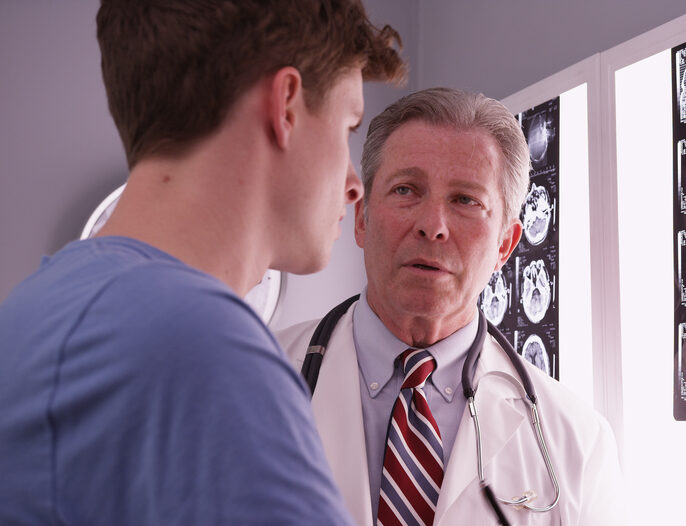



A physical exam is an essential part of the concussion assessment. The doctor will check for any obvious signs of injury, such as bruising or swelling. They may also evaluate the neck and spine to ensure there are no injuries that could be contributing to symptoms. Additionally, they may test balance, coordination, and reflexes.
Initial assessments will often involve close monitoring and observation. A doctor will look for neurological signs of a concussion, which can include changes in alertness, coordination, and reflexes. They might ask questions or engage in conversation to assess your cognitive function. Family members may also be asked about any changes they’ve noticed in behaviour or symptoms since the injury occurred.
Cognitive testing plays a critical role in the diagnosis of concussions. This might include asking the patient to perform tasks that measure their cognitive functions, such as memory and concentration. The doctor may use standardised tools such as the SCOAT6 (Sport Concussion Office Assessment Tool 6) or Child SCOAT6 in addition to other neurocognitive tests to evaluate and manage the concussion.
While imaging tests like MRI and CT scans are not necessary for a concussion diagnosis, they’re important tools for ruling out other serious conditions like skull fractures and bleeding in the brain. These tests may also be ordered if a patient has certain risk factors or is experiencing severe symptoms. It’s key to remember that the absence of abnormalities on these scans does not rule out a concussion.
Active treatments to discuss
with your doctor
Your doctor is most likely to recommend active treatments if more than one month has passed since the injury and you’re still experiencing symptoms. At this time, your doctor may also diagnose you with persistent post-concussion symptoms (PPCS), what used to be known as Post-Concussion Syndrome (PCS).
Treatment options can include, but aren’t limited to, physical therapy, occupational therapy, vision therapy, cognitive behavioural therapy, speech therapy, physical therapy, and mindfulness and meditation. Your doctor may recommend multiple treatments, and it may take time to find one that’s right for you. Don’t lose hope – your symptoms will get better with time and the right therapies.
Visit our PCS Treatments page for detailed information on each of these treatment options.
Concussion care at home
It’s necessary to treat a concussion under the guidance of a medical professional. However, once a concussion has been diagnosed and the patient has received proper medical care, doctors will often recommend additional measures to aid in the recovery process. These may include:



Proper rest is one of the most important aspects of concussion treatment at home. Sleep supports the brain’s natural healing processes, so ensuring you get plenty of quality sleep is essential.
Rest during the day can also be beneficial, including taking breaks when you feel fatigued and avoiding overexerting yourself. This may mean taking time off work, school, and other aspects of daily life until you’ve fully recovered.
A good rule of thumb is to avoid activities that noticeably increase your symptoms. Activities that are mentally taxing, such as working on a computer, playing video games, or watching television, can worsen symptoms like headaches and dizziness. Reducing screen time is particularly important because the light from screens can strain your eyes and brain.
When you do need to use screens, take frequent breaks and limit the amount of time spent using them. If possible, give your brain time to rest and heal by avoiding activities that require a lot of concentration.
Some medications can help alleviate discomfort caused by concussions, such as pain or headaches. Always consult with a healthcare provider before taking medication, as certain drugs may not be recommended following a concussion.
When approved by a doctor, over-the-counter pain relievers like acetaminophen can be used according to the label’s instructions. Remember, while these methods can aid your recovery, they do not replace medical attention. Always follow the guidance of healthcare professionals when treating a concussion.
Common concussion care
mistakes
There are several common mistakes people often make when trying to recover from a concussion. These missteps can prolong the recovery process and potentially cause further damage.
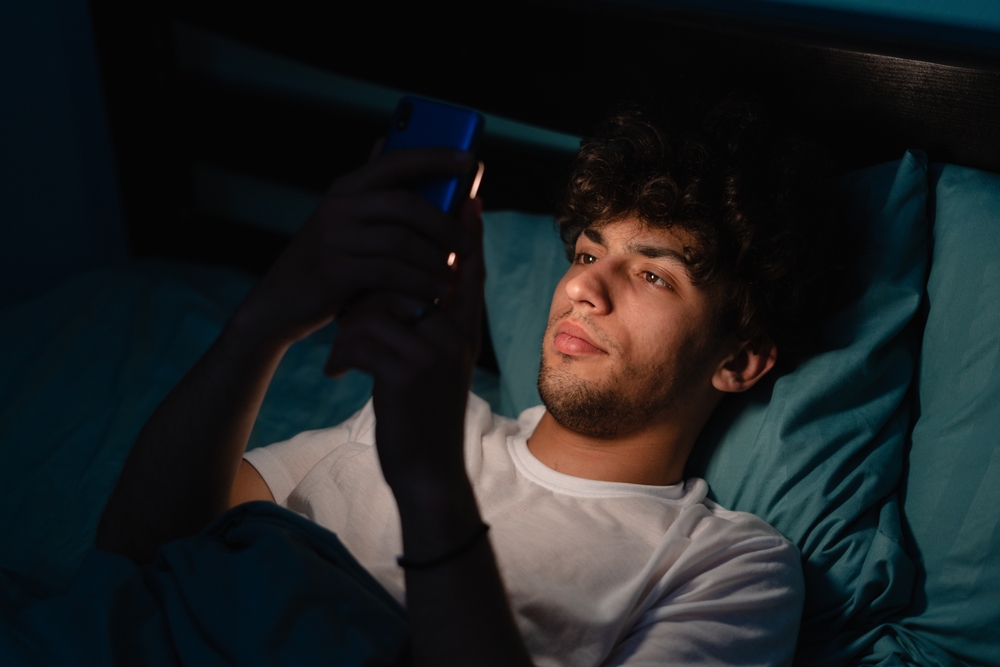



One of the most critical mistakes is dismissing or ignoring concussion symptoms. Symptoms like headache, sensitivity to light and noise, ringing in the ears, or memory loss shouldn’t be taken lightly. These are indicators that your brain has experienced trauma and needs attention.
While some symptoms may be immediate, it’s also important to pay attention to delayed symptoms, which can arise hours or even days after the initial injury. If you begin to experience any symptoms, it’s essential to speak with a healthcare provider and get evaluated for a concussion.
Another mistake is the over-reliance on medication. While over-the-counter pain relievers can help manage some concussion symptoms, they shouldn’t be used to mask ongoing issues. Pain medication does not address the underlying injury and could lead to overlooking significant symptoms that warrant medical attention.
Rest is a foundational element of a successful concussion recovery. However, many make the error of not allowing themselves enough downtime. They want to return to daily routines or favorite activities, which can exacerbate symptoms.
During recovery, physical and cognitive rest are necessary to allow the brain to heal. This means limiting activities that require concentration and focus if they increase your symptoms, such as reading, working on the computer, playing video games, and physical exertion.
Returning too quickly to normal activity after a concussion can lead to setbacks or the worsening of symptoms. Following a gradual return-to-activity plan, as advised by healthcare professionals, is very important. Recovery timelines can vary greatly from person to person, and it’s important to tailor the pace of your return to how your body is healing and a doctor’s recommendation.
The dangers of ignoring a
concussion
Ignoring a concussion can have serious consequences. If left untreated, concussions can lead to long-term problems such as chronic headaches, difficulty focusing and concentrating, memory loss, depression, and anxiety. Additionally, if an individual sustains multiple concussions without proper treatment or rest in between, it can result in Second Impact Syndrome (SIS), which can be life-threatening.
- Second impact syndrome – statpearls – NCBI bookshelf. (n.d.-c). https://www.ncbi.nlm.nih.gov/books/NBK448119
- Centers for Disease Control and Prevention. (2019, February 12). Concussion signs and symptoms. Centers for Disease Control and Prevention. https://www.cdc.gov/headsup/basics/concussion_symptoms.html
- Iverson, G. L., Howell, D. R., Patten, R. V., Bloomfield, P., & Gardner, A. J. (2021). Sport Concussion Assessment Tool-5th Edition (SCAT5): Normative Reference Values for the National Rugby League Women’s Premiership. Frontiers in Sports and Active Living, 3. https://www.ncbi.nlm.nih.gov/pmc/articles/PMC8189316/
- Leddy, J. J., Haider, M. N., Ellis, M., & Willer, B. S. (2018). Exercise is Medicine for Concussion. Current Sports Medicine Reports, 17(8), 262. https://www.ncbi.nlm.nih.gov/pmc/articles/PMC6089233/
- Centers for Disease Control and Prevention. (2019a, February 12). Concussion signs and symptoms. Centers for Disease Control and Prevention. https://www.cdc.gov/headsup/basics/concussion_symptoms.html
- AM;, J. S. M. (n.d.). Neuropsychological assessment of sport-related concussion. Clinics in sports medicine. https://pubmed.ncbi.nlm.nih.gov/33187615
- Han, B. I., Song, H. S., & Kim, J. S. (2011, December). Vestibular rehabilitation therapy: Review of indications, mechanisms, and key exercises. Journal of clinical neurology (Seoul, Korea). https://www.ncbi.nlm.nih.gov/pmc/articles/PMC3259492/
- Hallock, H., Mantwill, M., Vajkoczy, P., Wolfarth, B., Reinsberger, C., Lampit, A., & Finke, C. (2023a, April). Sport-related concussion: A cognitive perspective. Neurology. Clinical practice. https://www.ncbi.nlm.nih.gov/pmc/articles/PMC9987206/
- G;, M. M. S. E. (n.d.). Behavioral therapies and mind-body interventions for posttraumatic headache and post-concussive symptoms: A systematic review. Headache. https://pubmed.ncbi.nlm.nih.gov/30506568/
